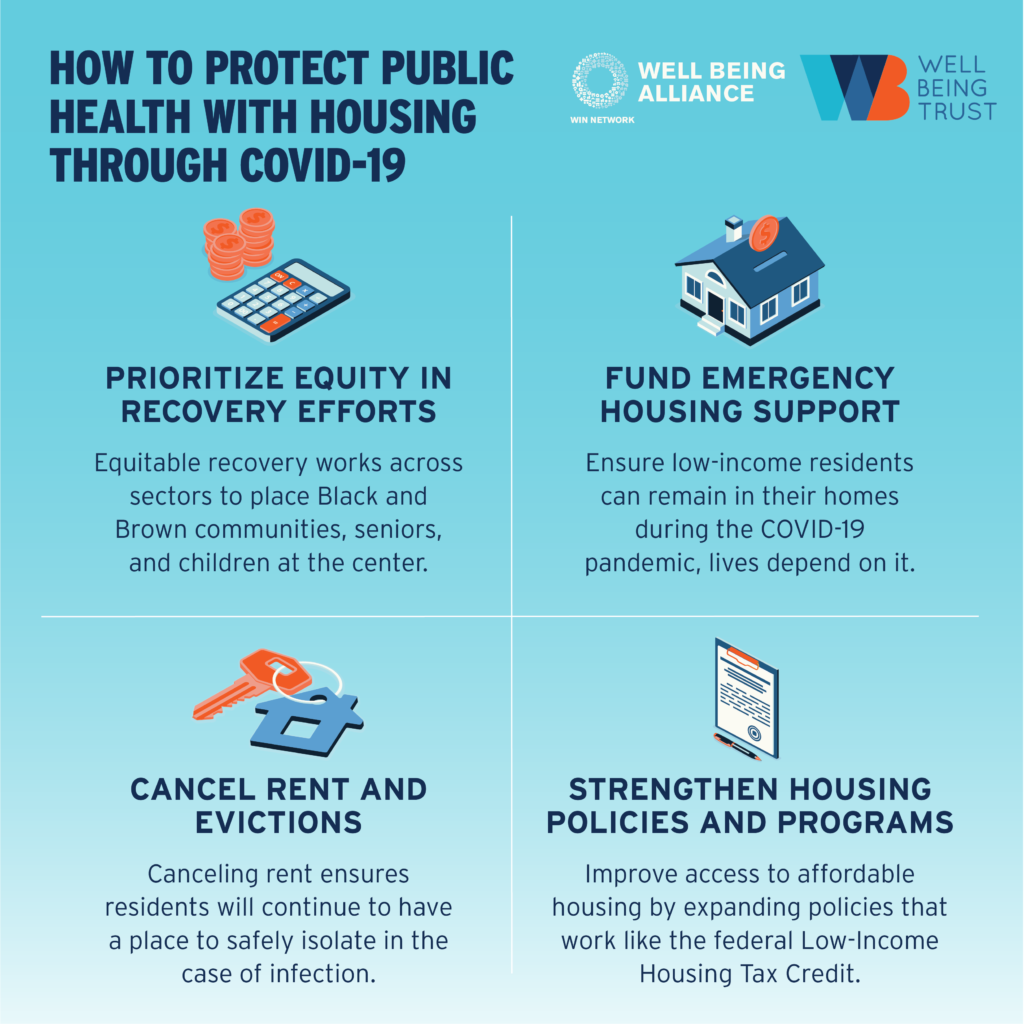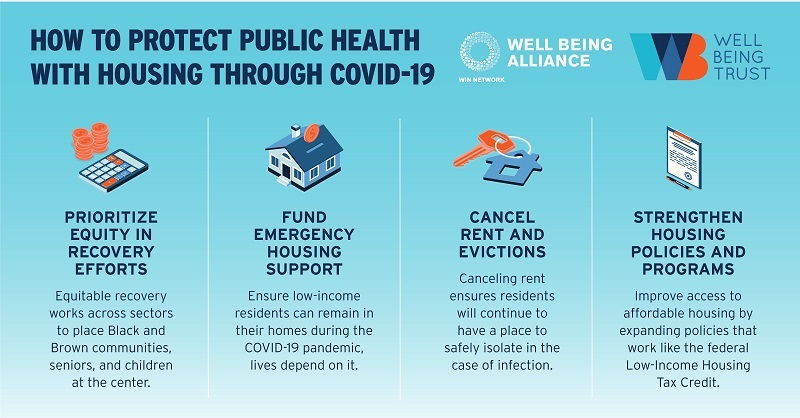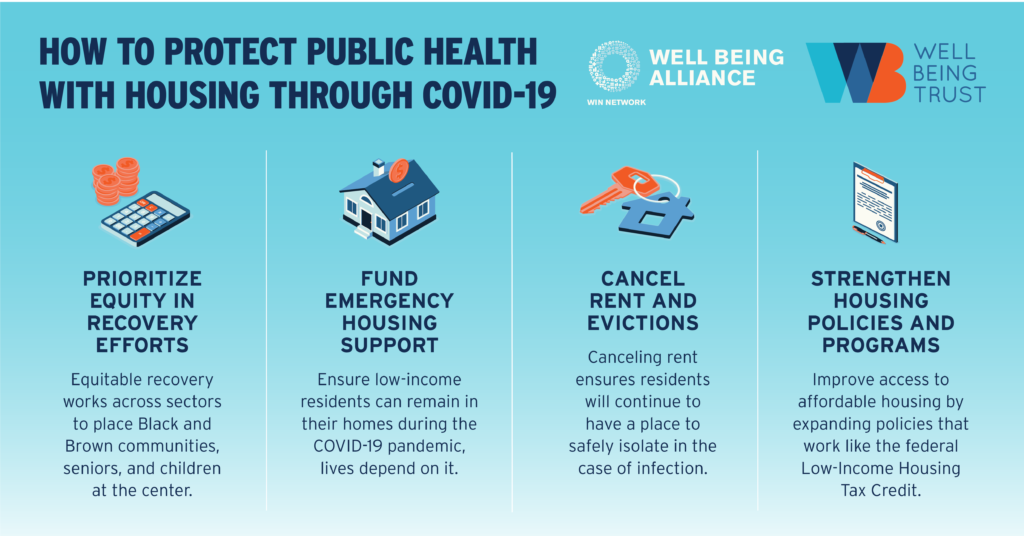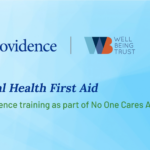Solutions to Ensure Housing Access Amidst and After a Pandemic
We can protect public health by providing safe, affordable housing
Blog by Lisa Herron, Executive Fellow, Well Being Trust
The rapid spread of COVID-19 across the nation has exposed many gaps and shortcomings in the U.S. housing system, which has failed to protect the health and well-being of vulnerable populations, especially Black, Brown and other people of color. Challenges to income during the pandemic are putting low-income tenants at risk of evictions and utility shutoffs, as well as creating strains on shelters supporting homeless individuals and families. Some people in shared housing have been kicked out for simply contracting the virus.
Access to shelter is a human right. With social distancing guidelines and stay-at-home orders in place for many communities across the country, access to safe, stable, and affordable housing is more important than ever. As we look for ways to limit the spread of the virus and reduce risks to public health, improving access to housing needs to be part of that solution.
Members of the Well Being Alliance, including the Democracy Collaborative, Enterprise Community Partners, PolicyLink and others, are working to keep housing policy at the forefront of the COVID-19 response plan.
Our collective health and well-being depend on building opportunity for everyone. Yet, across and within regions there are stark 
As a result, we consistently see worse health outcomes for people with low incomes and people of color. We cannot thrive as a nation when the factors that contribute to good health are available to some, but denied to others. Numerous studies have also shown how structural racism in the U.S. housing system has contributed to stark and persistent racial and health disparities for low-income and communities of color. Reducing inequities in health requires us to examine, target and address the systems that initiate and sustain inequities in a broad range of societal institutions that are the drivers of these inequities.
Access to homeownership, better schools, healthy food options and other positive externalities afforded to mostly non-Hispanic white communities are less available to households of color. For example, as Enterprise described in their quarterly Housing Tenure Report, black households today have lower homeownership rates than all other racial and ethnic groups. This not only limits opportunities for asset building, but also locks black families out of owning homes in neighborhoods that generally have better outcomes with respect to education, health care and employment.
Ensure Recovery Efforts Equitable
While the outcomes of our COVID-19 emergencies are still evolving, equitable place-based recovery can be built on five key principles.
- Equitable recovery places Black and Brown communities, seniors, and children at the center. It begins with respect, works to gain trust, and builds on community priorities and strengths. Many of these communities, immigrants and others have been hardest hit – often deemed essential, yet economically vulnerable and relegated.
- Equitable recovery is built on cross-sector solutions. These crises impact multiple sectors – from housing and food security, to employment and local businesses, to mental health and city budgets. The challenges compound each other, and effective solutions are integrated.
- Equitable recovery builds on successful emergency response activities and any equitable pre-COVID practices, and these successes are integrated into standard practice moving forward.
- Equitable recovery addresses acute fiscal challenges in communities, as recovery requires solvency. Effective financial planning invests in equitable outcomes.
- Equitable recovery leverages and aligns funding so that each dollar has multiple impacts – supporting food secure households, better connecting through improved broadband in healthy homes, more accessible to good schools and jobs, in thriving communities.
Fund emergency housing assistance.
Social distancing guidelines and shelter-in-place orders emphasize the health risks of not staying at home. But as millions of workers — particularly people of color — lose their jobs and income, being able to pay rent has become a significant point of concern. People experiencing homelessness are also having an even harder time protecting their health during this time, particularly if they do not have a safe space in which to isolate in case of infection. Although the CARES Act prohibits evictions in federally backed rental units through late July, there are still people losing their homes.
Enterprise Community Partners recently launched the Emergency Action for Resident and Partners Stability program, which aims to ensure low-income residents can remain in their homes during the COVID-19 pandemic. In addition to providing emergency grant funding, the program will also provide support accessing government relief funds and other needed assistance.
Enact moratoria on evictions and cancel rent for all.
Housing quality and stability has also been a persistent challenge for black households. Eviction rates among black renters are often many times that of non-Hispanic white renters. Partially as a consequence, HUD’s latest Annual Homeless Assessment Report to Congress shows that nearly 40 percent of the people experiencing homelessness are black, including nearly 27 percent of people experiencing unsheltered homelessness, despite representing only 13 percent of the population.
PolicyLink and the Alliance for Housing Justice is organizing campaigns at the national, state and local levels to stop evictions and cancel rent to relieve those most affected by the pandemic while it is ongoing. Because people who have lost their jobs and income during the pandemic will not be paid back outside of unemployment benefits, residents should not be required to pay missed rent after the pandemic.
Rent cancellation supports a wide range of populations, including undocumented residents, people without a permanent address or bank account, and low-income people of color, who experience the most housing instability and highest rates of homelessness. Cancelling rent is also in the interest of public health because it ensures residents will continue to have a place to safely isolate in the case of infection.
The Opportunity Starts at Home campaign was successful in including its most urgent priorities to ensure housing stability during and after the pandemic in the U.S. House of Representative’s enacted “HEROES Act”: a uniform evictions moratorium, $100 billion for emergency rental assistance; and $11.5 billion for homeless assistance. The U.S. Senate has yet to consider this Act or another COVID-19 relief bill.
Expand and strengthen housing-related policies and programs.
The Democracy Collaborative is calling on policymakers to expand and strengthen policies that will improve access to affordable housing. One of their policy priorities is the federal Low-Income Housing Tax Credit (LIHTC), which allows developers to sell federal tax credits to investors in order to raise funds to build affordable housing. Since its inception in 1986, the program has helped house about 7.4 million low-income residents.
Passing the Affordable Housing Credit Improvement Act (S. 1703 and H.R. 3077) — which would increase the housing credit by 50% and therefore raise additional money for affordable housing efforts — would expand the LIHTC program’s reach by giving private developers incentives to build and preserve more than half a million homes, in addition to creating jobs and generating billions in wages, business income and tax revenue over the next decade. The ACTION campaign that Enterprise Community Partners co-coordinates is advocating for components of the Act to be included in the next COVID-19 relief bill, particularly enacting a minimum 4% Housing Credit rate, as the current floating rate for acquisition and bond-financed production has hit a historic low due to reduced federal borrowing rates and is threatening the viability of critical affordable housing developments.
The U.S. was failing to provide enough affordable housing to meet demand long before the pandemic hit. Policymakers could have prevented this from becoming a reality, but instead, they allowed these consequences to play out and further burden the most vulnerable populations already struggling amid the difficult conditions created by COVID-19.
Coronavirus has created interconnected crises across our health, economic, and fiscal landscapes. The health disaster is impacting communities in ways other natural disasters have – closing schools and businesses, swamping our medical system, and centering local and state government and their partners as necessary leaders in both emergency response and recovery. The economic and fiscal disasters already appear deeper and wider than the Great Recession and effects are rippling across our employment, housing, and service sectors. We know the recovery from the last recession was slow and uneven, particularly for people and communities that have been marginalized. As we learn the extent of the impacts and start to transition to recovery we can support communities in centering equity as a foundation for recovery.






